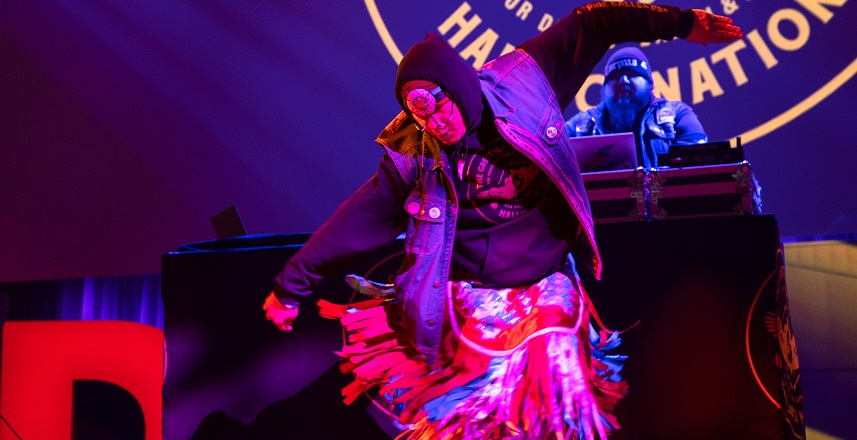It’s been a year since I asked Canadian settlers to become allies of the founding nations of this land and to work towards meaningful reconciliation by reading, watching, or listening to one Indigenous viewpoint each week. I thought this would be a good time to check in and take inventory of how things were going.
Have you found out what unceded territory you live on? Canada is a nation of treaties. These legally binding agreements between sovereign nations have no expiry date and are just as valid today as when they were originally signed. Find out which nation inhabited the land you live on, the treaty that governs it, and how nation-to-nation negotiations are going.
While you’re at it, look into the location of the residential school that was closest to you. The CBC‘s interactive map makes it quick and easy. It’s surprising how many settlers had residential schools in their very own backyards and never knew.
Did you order a copy of the Truth and Reconciliation Calls to Action? This tiny booklet divided into three powerful sections covers the ten principles of reconciliation, the 94 calls to action, and the 46 articles of the United Nations Declaration on the Rights of Indigenous Peoples (UNDRIP).
The calls to action are specific actions that need to be undertaken to redress the residential school legacy and promote reconciliation. UNDRIP formally establishes and maintains mutual respect between Indigenous and non-Indigenous people in Canada. Taken together, these documents initiate the process of repairing relationships between Indigenous and settler communities.
You can order your copy by contacting the National Centre for Truth and Reconciliation or calling toll-free 1-855-415-4534. The cost is $7 per booklet.
Now, let’s add a few more books to your summer reading list:
- 21 Things You May Not Know About The Indian Act,by Bob Joseph
- The Reconciliation Manifesto: Recovering the Land Rebuilding the Economy, by Arthur Manuel and Grand Chief Ronald Derrickson
- Unsettling Canada: A National Wake-up Call, by Arthur Manuel and Grand Chief Ronald M. Derrickson
- The Inconvenient Indian, by Thomas King
- Fearless Warriors, by Drew Hayden Taylor
- Indian Horse, by Richard Wagamese
- Living in the Tall Grass: Poems of Reconciliation, by Chief R. Stacey Laforme
Remember to share what you’re learning with all the children that you know and love.
Here’s a special list of children’s books that are perfect to read and discuss together:
- Spirit Bear and Children Making History, by Cindy Blackstock and Eddy Robinson
- When We Were Alone, by David A. Robertson
- I AM Not A Numbe,r by Jenny Kay Dupuis and Kathy Kacer
- Missing Nimama, by Melanie Florence
- The Sharing Circle, by Theresa Meuse
- Stolen Words, by Melanie Florence
A few movies and documentaries for those summertime rainy days will help pass the time in a reconstructive way:
- Indian Horse (2018)
- Our People Will Heal (NFB 2017)
- The Road Forward (NFB 2017)
- Colonization Road (CBC Documentary 2017)
- Birth of a Family (NFB 2017)
- This River (NFB 2016)
- Angry Inuk (NFB 2016)
- We Can’t Make the Same Mistake Twice (NFB 2016)
- Trick or Treaty (NFB 2014)
- Two Worlds Colliding (NFB 2004)
Now, some music:
- Bush Lady (Alanis Obomsawin, re-issued after 3 decades in June 2018)
- Medicine Songs (Buffy Sainte-Marie, 2017)
- Power in the Blood (Buffy Sainte-Marie, 2015)
- iskwe – self-released albums
- A Tribe Called Red — electronic music group, blending eclectic music with chanting and drumming
- The Jerry Cans — from Iqaluit, Nunavut, singing in the Indigenous language of Inuktitut
- Indian City – folk, rock, and pop
- Ghostkeeper — experimental pop/rock
As for straightforward points of view and creative, innovative First Nation, Metis, and Inuit ideas, listen to Unreserved with Rosanna Deerchild on CBC Radio One and choose from a wide variety of shows on the Aboriginal Peoples Television Network.
Again, this year, it’s impossible for me to celebrate Canada’s ‘birthday’ while Indigenous treaty claims are ignored and basic human rights remain unmet.
I have hope that once Canadians make an honest effort to familiarize themselves with Canada’s horrific treatment of First Nations, Metis, and Inuit peoples that we can work together to bring about truthful reconciliation.
So, the challenge going forward, take part in 150 Days of Reconcili-Action by joining others across the country taking the #NEXT150 Challenge. Together, we can work nation with nation to make the next 150 years something to celebrate.
Image: TEDConference/Flickr
Like this article? Please chip in to keep stories like these coming.




